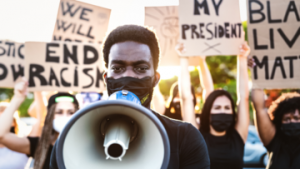Our country faces a reckoning as the pandemic has laid bare many of the disparities and biases that have only been exacerbated during the past year. Hate crimes against the Asian American and Pacific Islander (AAPI) communities have risen dramatically since the start of the pandemic. This moment in our country demands action.
On Tuesday, I joined Connecticut Attorney General William Tong to co-host a landmark national convening on countering hate against AAPI communities.
Taking place during Asian American Pacific Islander Heritage Month, the event brought together some of the greatest minds from across the nation to have an honest, solutions-oriented conversation about how to stop anti-AAPI hate.
Along with leaders and experts from the advocacy, policy, business, and law enforcement communities, we examined the history of anti-AAPI hate, the rise of online hate and its real-world consequences, how law enforcement is responding to hate, the importance of nuanced and multi-dimensional representation, and the need for each of us to stand up to hate and support survivors. We also pledged to take tangible steps to help combat anti-AAPI hate and called on others to do the same.
Last year, I launched a year-long initiative as the president of the National Association of Attorneys General. That initiative – called The People v. Hate – is all about addressing hate, and this week's convening was an important part of it.
When I first launched that initiative, my goal was to unite individuals from different political parties, various industries, and all levels of government around how to address hate and seek solutions. At the convening earlier this week, we did just that.
I learned a lot on Tuesday. I feel full of new knowledge after listening to so many thoughtful and incredible voices and leaders. I am moved by the profiles in courage that I heard. I am inspired by the innovation and commitment I saw. This convening truly exemplified how necessary it is for us to try and understand more about each other.
But the conversation does not just end here. We have compiled a resource toolkit so you can learn how to report hate crimes, receive support, and train to be an active bystander.
And in case you missed it, you can watch our discussions from the convening here.
Thank you.

Karl A. Racine
Attorney General
All District Residents 18 or Older Are Now Eligible To Receive the COVID-19 Vaccine, No Appointment Needed
On May 1, the District transitioned to vaccination walk-up sites. There are 11 high-capacity, walk-up, no appointment needed vaccination sites throughout the District. These walk-up sites are for first doses. When you receive your first dose, you will make an appointment to receive your second dose.
In addition to walk-up sites, pharmacies, clinics, and health care providers throughout the District are also administering the vaccine. These sites have their own scheduling systems.
If you are unable to leave your house, call 1-855-363-0333, and vaccine administrators will come to you.
For more information, visit coronavirus.dc.gov/vaccinatedc .
Offering To Help Seal Records of Eligible Protesters Arrested Last June for Curfew Violations
Last week, OAG announced that we declined to prosecute the vast majority of protesters who were arrested in early June 2020 for violating the Mayor’s curfew order while protesting in the District following the murder of George Floyd. To make the process easier and more accessible, my office also proactively offered to file motions on behalf of eligible individuals, asking a judge to seal their arrest records. Without OAG's assistance, individuals would need to wait until two years after the arrest, and file a motion themselves or with the assistance of an attorney. Instead, we waived the waiting period and offered to do the work for them so these individuals won't need to hire an attorney or struggle with the process themselves. Our office has testified in support of changing this process so misdemeanor arrests that do not result in conviction are automatically sealed, which would reduce obstacles to record sealing. Read more from the Washington Post.
Calling On Congress To Fund Modernization of State Systems for Sealing and Expungement of Criminal Records
Last month, Arizona Attorney General Mark Brnovich and I co-led a bipartisan coalition of 22 attorneys general urging Congress to provide federal funds for state systems and technology upgrades needed to seal and expunge criminal justice records. These funds could help some of the nearly 70 million Americans – one third of U.S. adults – clear or expunge records of arrest or conviction. An old criminal record shouldn’t be a life sentence, especially for those who have turned their lives around. Implementing thoughtful ways to clear records would make the criminal justice system more efficient, more cost-effective, and most importantly, more just, helping expand opportunities for millions of Americans and their families. Read more here.
Holding Fitness Training Company Accountable for Fraudulent Medicaid Billing Scheme
Last week, OAG announced a lawsuit against Oji Fit World, a fitness training company, for filing false Medicaid claims and defrauding the District. In the lawsuit, we alleged that Oji Fit World and its owner engaged in a scheme to profit by overbilling Medicaid – and as a result, District taxpayers – for fitness services provided to individuals with intellectual and developmental disabilities. Medicaid is a lifeline program that enables individuals with disabilities to get care and services they need to be healthy—and Oji Fit World stole from this much-needed program. Read more here.




